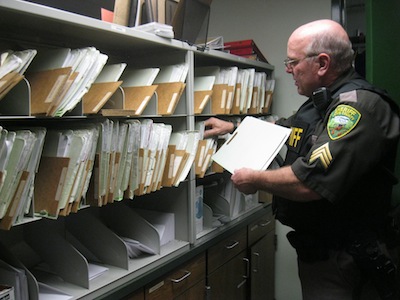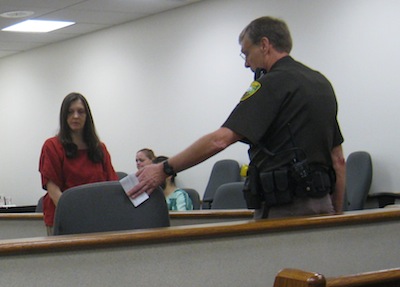
Lewis County Jail Corrections Sgt. Ron Anderson shows how any ICE detainers the jail receives are placed loose in an inmate’s folder, so a phone call can be made when people are to be released.
By Sharyn L. Decker
Lewis County Sirens news reporter
CHEHALIS – Federal immigration authorities issued their first list last week to highlight jails that don’t cooperate with ICE detainers or requests for notification of release of aliens who are potentially removable from the country.
It’s possible it won’t be long before the Lewis County Jail lands on the list.
Lewis County Sheriff Rob Snaza says this isn’t a “sanctuary county” but, his jail doesn’t and won’t hold inmates for immigration officers to come and pick up based on a detainer.
When it’s time to be released, whether because they’ve posted bail or their sentence is served, inmates get set free.
“We will not keep you, unless you have a warrant,” said Snaza, a Republican who was elected to his position in 2014 with 77 percent of the vote in a two-way race.
The jail used to routinely honor the detainers, until a federal court case in 2014 in Oregon after which they changed their policies. Lewis County Prosecutor Jonathan Meyer said the court decision concluded the ICE detainer is not a warrant, it’s more like a letter.
“We don’t have the authority to hold anyone just on a detainer,” Meyer said.
Meyer didn’t know how many jurisdictions in Washington have taken the same position, but said he didn’t think the county’s interpretation was out of the norm.
U.S. Immigration and Customs Enforcement (ICE) is a division of the Department of Homeland Security.
The report issued March 20 is required by an executive order signed by President Donald Trump on Jan. 25, according to DHS.
The agency stated it plans to publish a report weekly to inform the public of criminal actions committed by aliens and any jurisdictions which choose not to cooperate, potentially endangering Americans.
Neither the press release or companion report acknowledge the legal position that Lewis and other counties have taken.
“When law enforcement agencies fail to honor immigration detainers and release serious criminal offenders, it undermines ICE’s ability to protect the public safety and carry out its mission,” Acting ICE Director Thomas Homan stated. “Our goal is to build cooperative, respectful relationships with our law enforcement partners.”
The Lewis County Jail in Chehalis – the county seat – houses arrestees from sheriff’s deputies, from the Washington State Patrol and police from all the cities and towns within the county. It also holds those who are sentenced locally to less than one year.
On any given day, it’s population is roughly 200 inmates, give or take about 20.
Despite the sheriff’s stance, the jail isn’t entirely uncooperative.
Deputies enforce state laws and county codes, and don’t ask people about their citizenship or immigration status, according to Snaza.
However, when anyone is booked into the jail, one question is asked of all of them.
Where were you born?
If the answer is anything but inside the United States, corrections officers will notify ICE.
Jail staff don’t attempt to figure out anyone’s citizenship or immigration status, they leave that up to the immigration authorities.
Lewis County Jail Corrections Sgt. Ron Anderson said they fax information on foreign born individuals probably three or four times each month to the ICE field office in Seattle. And about once a month, ICE will fax back a detainer on someone.
The piece of paper goes into the inmate’s file and when it’s time for that person to get out, a corrections officer will phone ICE and let them know what time the individual is going to be released.
Anderson said maybe only once so far this year, an immigration officer has actually shown up and taken someone into their custody.
“It’s a lot different than it used to be,” he said.
Anderson, who has worked at the facility for 30 years, recalls the process before the 2014 change.
“If the agency said they couldn’t get down here till the next day, we would hold the person,” he said.
ICE used to come down and conduct sweeps, Anderson said.
DHS’s first report – called the Declined Detainer Outcome Report – contains a section which names the 10 “non-cooperative” jurisdictions which had the highest number of detainers issued to them during the seven-day period that began Jan. 28.
Two Pacific Northwest entities appear; Snohomish County with 12 detainers issued and Washington County in Oregon with seven.
Washington County Sheriff Pat Garrett issued a press release the same day, taking issue with the feds suggesting some choose not to cooperate.
“(It) does not accurately describe the difficulties or potential legal ramifications associated with honoring ICE detainer requests,” Garrett stated.
Sheriff Garrett went on to recount how in April 2014, a judge for the U.S. District Court of Oregon found Clackamas County violated Maria Miranda-Olivares’ constitutional rights, by holding her on an ICE detainer, ultimately costing taxpayers more than $100,000.
The ruling that detainer requests are unconstitutional led every county in Oregon to immediately stop honoring them, according to Garrett.
Like Sheriff Snaza and Prosecutor Meyer, Garrett said his county will honor any warrant or court order to detain a person.
Another section of the March 20 report includes a table presenting information about 206 declined detainers around the country during the seven-day period, naming the facility, the county and state, along with the country of citizenship and examples of criminal activity – charges or convictions – associated with each case.
ICE sends detainers if it possesses probable cause to believe that the alien is removable from the United States. The report notes however, the agency does not document in a systematically reportable manner, the immigration status of each target.
Another table in the report shows more than 100 jurisdictions throughout the country, of which ICE has become aware, which have policies that limit cooperation with ICE. The majority of them indicate they will not hold individuals solely on an ICE detainer, with several suggesting with various phrasing they will honor a warrant or court order.
Lewis County Undersheriff Wes Rethwill put it this way:
“We do have open lines of communications with all agencies,” he said. “But the whole detainer thing is a civil piece in the federal system, and we don’t act on civil stuff.”
Earlier this month, after news headlines abounded about presidential executive orders dealing with immigration and immigration bans, the Lewis County Sheriff’s Office command team sent a memo to employees to affirm they were making no changes in how they operate.
“We will not go after people because of their status,” Snaza said. “That’s not our job.”
Prosecutor Meyer says the sheriff’s office is only authorized to enforce state law – and county ordinances – but not federal law.
Sheriff Snaza related that their primary mission is to keep the community and it’s people safe.
“In order to best accomplish this, we must build confidence so victims and witnesses to crimes come forward to report such criminal activity and/or seek assistance, as needed, without fear of becoming vulnerable to immigration repercussions,” his memo stated.
The memo reiterates that the sheriff’s office serves all people within Lewis County regardless of their immigrations status as well as noting that all people they come in contact with are entitled to the rights and protections of the state constitution and the U.S. Constitution.
The command team memo asks employees to be mindful of how their actions, statements and questions they can answer impact the public’s level of fear and trust in law enforcement.
These are tense times, Snaza said.
“When I hear of kids at school afraid of losing their mom or dad, that concerns me,” Snaza said.
He said he was discouraged when he heard some ICE agents were hanging around courthouses to find people.
Snaza said he wishes everyone could work together to help “these folks” to ease their concerns and fears.
“I’m not going to go into a home and rip a family apart,” Snaza said. “It’s not my job and there’s no way I’ll do that.”
It’s a conversation that’s been had even around his own dinner table, Snaza said.
His father-in-law, a Marine who went to Vietnam, worked here for some 30 years on a green card before he decided to take steps to become a U.S. citizen, he said.
“Most people in the U.S. illegally want to make a better life for themselves,” Snaza said. “It’s a small percent that do the crime.”
ICE issued a press release yesterday announcing 84 foreign nationals were arrested during a recent three-day operation conducted in Washington, Alaska and Oregon.
They targeted at-large criminal aliens, illegal re-entrants, and immigration fugitives.
Sixty of them have criminal histories including prior convictions for sex crimes, drug offenses and domestic violence but the most common was driving under the influence, according to ICE.
Seven of them were women. They came from 12 countries, with the largest number (64) from Mexico.
The enforcement actions took place in 20 communities, and King County accounted for the largest number of arrestees at 19.
Among them, two people were picked up in Thurston County, three in Cowlitz County and one in Mason County.
Rose M. Richeson, public affairs officer for ICE for the Pacific Northwest, said she didn’t have a label for someone who arrived to this country with a visa and never left when they were supposed to.
“They’re not considered a priority, I don’t have a term for those people,” she said.
However, if they are picked up, they are dealt with on a case by case basis, she said.
Prosecutor Meyer today said the Washington Association of Prosecuting Attorneys is working with ICE to see if there are ways local jurisdictions could honor a new form of detainer.
“I worry it may have a chilling effect on victims reporting crimes,” Meyer said. “Our laws have to mean something.”
Sheriff Snaza shared a memo he received today from the Washington State Sheriff’s Association taking exception to ICE’s label of some as uncooperative.
Every sheriff in the state complies with the federal court decision that precludes them from holding inmates on ICE detainer requests, Cowlitz County Sheriff Mark Nelson, president of the WSSA wrote.
“Sheriffs need to uphold what is legal and what is right and not bend to political pressure or convenience,” Nelson stated. “The public expects us to enforce the law while obeying the law.”
Nelson’s letter notes that after the 2014 court decision within the Ninth Federal Circuit, sheriffs reached out to ICE in order to find a workable solution.
“ICE’s position has been less than cooperative,” Nelson wrote. “Their current approach has the potential to undermine long standing relationships between federal and local agencies.”
•








 Join us
Join us